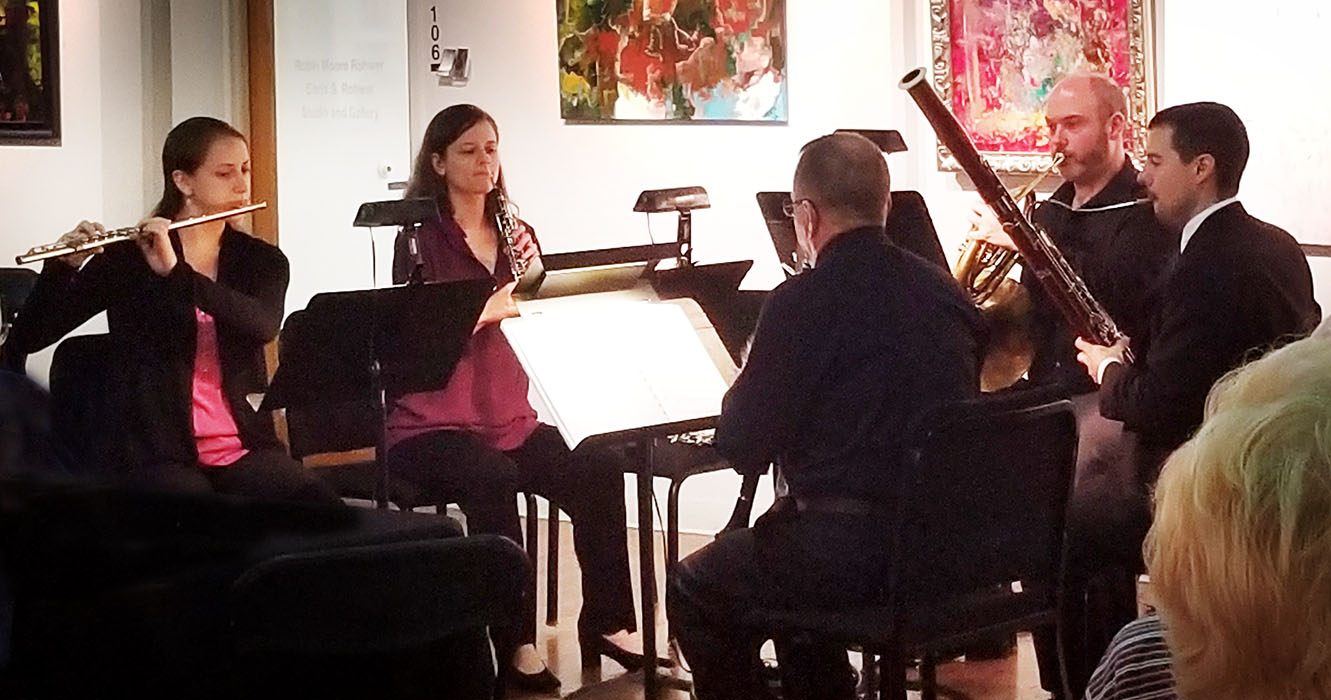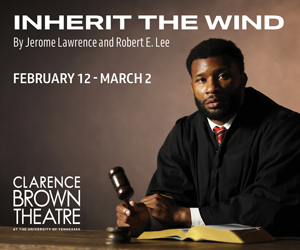Change is generally good. The Knoxville Symphony Orchestra’s lunchtime Q-Series, built around its Principal Quartet and the Woodwind Quintet, has seen a major venue change this season, leaving the Square Room and its presentational arrangement for the long rectangular gallery of Gay Street’s Emporium Center. Music and performance aside, there were logistical and cost advantages for the move—the KSO offices are just upstairs. And, we’re told, the move allows a more adventuresome catering arrangement, not a small issue when a buffet lunch for the audience is part of the deal.
However, a bit of random grumbling was heard from the audience at Wednesday’s first Q event of the season. With a space for the musicians in the middle of the gallery, surrounded by tables and folding chairs for the lunching audience, some felt a bit cramped and restricted. And, on top of it all, Wednesday’s crowd arrived somewhat soggy from the day’s heavy rainfall, a rainfall that was all too audible and visible throughout the hour plus of performance.
Of course, choosing works for performance rarely involves a weather forecast. But the Woodwind Quintet, by virtue of their rhythmically upbeat and texturally interesting choices, did their best to counter the soporific effect of the rain. They opened with Startin’ Something by contemporary New York City based composer Jeff Scott, who self-describes his music as “sensitive to and informed by the spirit and plight of the urban existence.” The Quintet moved fluidly through the short work’s delightful fits and starts, climbing and falling in combinations through a range of woodwind colors, dynamics, and tempo changes.
French composer Elsa Barraine’s Ouvrage de Dame was an interesting choice—and a timely one. As a female composer of significant ability, Barraine (1910-1998) was, nonetheless, subjected to critical scorn, if not outright sexism during her working career. The work, a theme and variations, was quite the showcase for the Quintet’s ability at the ebb and flow of featured instruments against the ensemble.
The Quintet closed with a work by contemporary Brazilian composer Julio Medaglia: Suite popular Brasiliera. The four movement work contrasted brass textures against racing flute lines, clarinet and oboe interjections, and emphatic bassoon strides, within a stylistic smorgasbord that at times suggested ragtime, Lerner and Lowe rhythms and melodies, and a half-dozen other motifs.
On the opening half of the concert, a trio of the four Principal Quartet members (violinist Edward Pulgar, violist Kathryn Gawne and cellist Andy Bryenton) took on Mozart and his Divertimento in E-flat, K. 563, or at least four of the six movements. However, at no fault of the trio and their well-conceived take on the Divertimento, no amount of string energy devoted to overcoming the effect of enervating heavy rain and a gray day would have been enough. The work is major late-Mozart with a compelling Adagio movement, someting I’d love to hear the trio do again under more conducive—and less soggy—circumstances.
Knoxville Symphony Orchestra’s Q Series
Woodwind Quinet
Hannah Hammel, flute
Claire Chenette, oboe
Gary Sperl, clarinet
Aaron Apaza, bassoon
Jeffery Whaley, horn
Principal Quartet
Gordon Tsai, violin
Edward Pulgar, violin
Kathryn Gawne, viola
Andy Bryenton, cello






